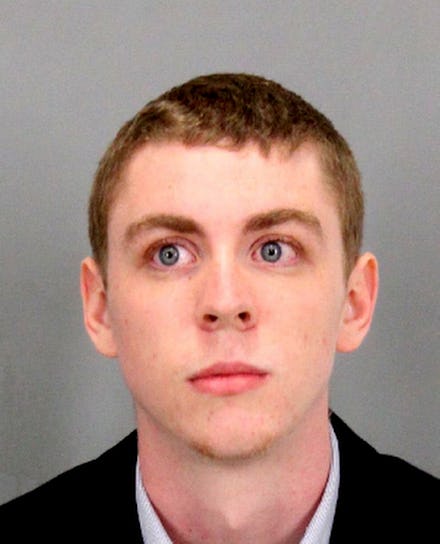The Brock Turner Case Shows That Bystander Intervention Actually Works

There's no shortage of travesties in the Brock Turner sexual assault case.
The entitlement that led the former Stanford University swimmer to commit a brutal sexual assault in the first place is matched only by the slap on the wrist Judge Aaron Persky gave him after his conviction, Turner's father's argument that his son was being unfairly punished for "20 minutes of action" and Turner's childhood friend's claim the sentencing he faced went too far.
"I don't think it's fair to base the fate of the next 10-plus years of [Turner's] life on the decision of a girl who doesn't remember anything but the amount she drank to press charges against him," Turner's friend, Leslie Rasmussen, wrote in her role as a character witness for the defense.
Not to mention how the defense attorneys characterized the woman Turner assaulted — insisting her drinking led to her assault, instead of Turner's decision.
Nearly everything about this case exposes the very worst of rape culture. But there's one glimmer of hope: It proves that bystander intervention actually works.
At the time of the assault in January 2015, two Stanford graduate students happened to be riding their bicycles past the scene of the crime. Peter Jonsson and Carl Fredrik Arndt confronted the man, chased him down and held him until police arrived.
In a moving letter the victim read at sentencing last week, she underscored just how important these two men were to her.
"I sleep with two bicycles that I drew taped above my bed to remind myself there are heroes in this story," she wrote in her statement to the court.
Sexual assaults, especially on college campuses, are hardly isolated incidents. At least 1 in 4 female college seniors reported experiencing some form of sexual assault on campus, according to a survey of 27 American colleges and universities commissioned by the Association for American Universities published in September.
Turner's particular case occurred near a college fraternity party, where dozens of bystanders might have potentially stepped in to stop him. In fact, the act of intervening to prevent or halt an assault — otherwise known as bystander intervention — is a strategy Vice President Joe Biden is betting on to stem the tide of campus sexual assaults.
"There is never a circumstance where a woman's assaulted — never — where it's her fault." — Vice President Joe Biden
"I'm convinced if we keep this up we can begin to change the culture on campuses," Biden said in an interview in April. "There is never a circumstance where a woman's assaulted — never — where it's her fault."
The vice president's It's On Us campaign encourages people to safely intervene in situations that could potentially escalate to sexual assault. In the same interview, Biden mentioned a series of campus town hall meetings where students were asked what they wanted to do to end this epidemic at their colleges and universities.
"I expected them to say, 'more lighting, lighting in parking garages, more campus cops,'" Biden said. "You know what the number one thing was? 'Get men involved.'"
Indeed, bystander intervention is a vastly underutilized tool. Here are some statistics that outline just how far we have to go to make it the norm:
The stakes of bystander intervention are high — and not just for stopping assaults before and as they occur, but for ensuring perpetrators are prosecuted too.
Brock Turner became an exception to the rule when he was convicted and sentenced to jail time. About 97% of rapists are never convicted, while the vast majority of rapes aren't prosecuted at all — a process made especially difficult if the victim was unconscious at the time of the attack, as she was in the Turner case.
At the end of the day, the fact remains that were it not for Jonsson and Arndt intervening, Turner might have faced no consequences at all for his actions.
"I can't understate how important those two heroes were in this case," Santa Clara County Deputy District Attorney Alaleh Kianerci told the Huffington Post Monday. "Those two heroes made this case a prosecutable one."
The decision to intervene is never easy. But it could make all the different in stopping a rape, or holding those responsible accountable for their actions.
Correction: June 7, 2016